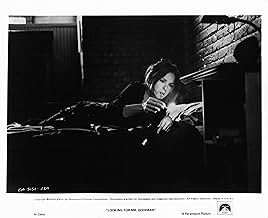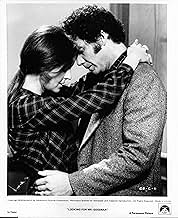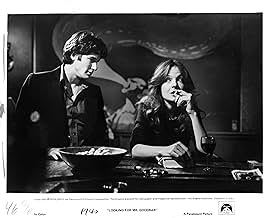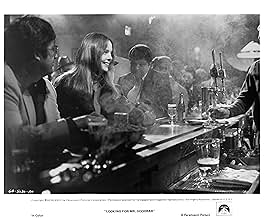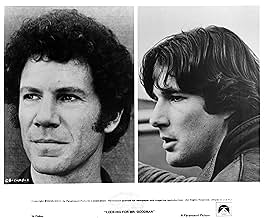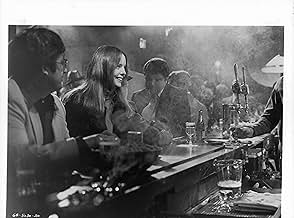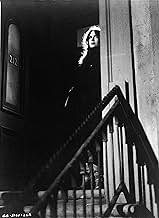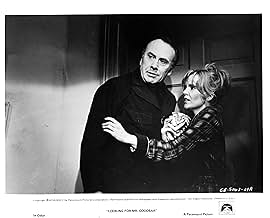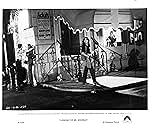IMDb-BEWERTUNG
6,7/10
9304
IHRE BEWERTUNG
Eine engagierte Schullehrerin verbringt ihre Nächte in Bars und sucht nach missbräuchlichen Männern, mit denen sie sich zunehmend auf gewalttätige sexuelle Begegnungen einlassen kann.Eine engagierte Schullehrerin verbringt ihre Nächte in Bars und sucht nach missbräuchlichen Männern, mit denen sie sich zunehmend auf gewalttätige sexuelle Begegnungen einlassen kann.Eine engagierte Schullehrerin verbringt ihre Nächte in Bars und sucht nach missbräuchlichen Männern, mit denen sie sich zunehmend auf gewalttätige sexuelle Begegnungen einlassen kann.
- Regie
- Drehbuch
- Hauptbesetzung
- Für 2 Oscars nominiert
- 1 Gewinn & 6 Nominierungen insgesamt
Empfohlene Bewertungen
The movie really gets the whole 1970s drug sniffing, gay liberation, pro swinger pre aids lifestyle down, and then closes with what may be one of the most depressing endings ever shot for a movie. As we all know, Diane Keaton is the straight laced teacher by day, and bar hopper by night. Her Catholic background and domineering father all contribute to her rampant promiscuity, and she ends up paying for it in the end. Sad, because the sexual revolution of the time gave women the right to do what she does in the film without being called whores, and then she had to pay for it. Such a good flick though, although it could have used a little editing for time. See it, and decide for yourself. Highly recommended, and perfect depiction of a life that really is impossible to imagine in this day and age.
Looking for Mr. Goodbar is directed by Richard Brooks and Brooks adapts the screenplay from the Judith Rossner novel of the same name. It stars Diane Keaton, Tuesday Weld, William Atherton, Richard Kiley, Richard Gere, Alan Feinstein and Tom Berenger. Music is by Artie Kane and cinematography by William A. Fraker.
Theresa Dunn (Keaton) is a dedicated schoolteacher to deaf children by day, but at night she cruises bars looking for abusive men with whom she can engage in progressively violent sexual encounters.
First off it should be noted that the Judith Rosner novel is based on the real life case of the 1973 murder of New York City schoolteacher Roseann Quinn. Also of note is that Rossner was not enamoured with this filmic adaptation.
What we have here is a tragic tale set in the promiscuous pre AIDS era of 1970s America. It's a bleak observation of the swinging singles scene of the era, providing caution of patriarch pressures, religious suffocation and the dangers of casual encounters for sexual gratification. Is it any wonder the big hitting critics of the time were nonplussed by it?...
The pic generated a lot of buzz for handsome new actor, Richard Gere, even if he does overact, it actually works in context to the brashness of the period. It also introduced Tom Berenger, in what is a frightening portrayal of a very sexually confused man. Tuesday Weld got a Best Supporting Actress Oscar nomination for playing Theresa's sister, which was richly deserved, so much so one wishes she was in the film more.
Yet it's Keaton who absolutely shines here, lifting an overlong picture to greater heights. Proving she had more in her armoury than merely playing kooks, Keaton imbues Theresa with a desperation and loneliness that is shattering for viewing purpose. The whole narrative bites with a crushing inevitability, that the nihilistic back drop can only bring pain and misery, and so it proves.
Richard Brooks should have sliced at lest thirty minutes from the run time, especially given that the "Theresa fantasy sequences" just come off as pointless and take one out of the heartbeat of the story. Yet this is still a fine movie, not one to be cheered up by of course, but poignant, relative and with the real life story at the core, important. 7/10
Theresa Dunn (Keaton) is a dedicated schoolteacher to deaf children by day, but at night she cruises bars looking for abusive men with whom she can engage in progressively violent sexual encounters.
First off it should be noted that the Judith Rosner novel is based on the real life case of the 1973 murder of New York City schoolteacher Roseann Quinn. Also of note is that Rossner was not enamoured with this filmic adaptation.
What we have here is a tragic tale set in the promiscuous pre AIDS era of 1970s America. It's a bleak observation of the swinging singles scene of the era, providing caution of patriarch pressures, religious suffocation and the dangers of casual encounters for sexual gratification. Is it any wonder the big hitting critics of the time were nonplussed by it?...
The pic generated a lot of buzz for handsome new actor, Richard Gere, even if he does overact, it actually works in context to the brashness of the period. It also introduced Tom Berenger, in what is a frightening portrayal of a very sexually confused man. Tuesday Weld got a Best Supporting Actress Oscar nomination for playing Theresa's sister, which was richly deserved, so much so one wishes she was in the film more.
Yet it's Keaton who absolutely shines here, lifting an overlong picture to greater heights. Proving she had more in her armoury than merely playing kooks, Keaton imbues Theresa with a desperation and loneliness that is shattering for viewing purpose. The whole narrative bites with a crushing inevitability, that the nihilistic back drop can only bring pain and misery, and so it proves.
Richard Brooks should have sliced at lest thirty minutes from the run time, especially given that the "Theresa fantasy sequences" just come off as pointless and take one out of the heartbeat of the story. Yet this is still a fine movie, not one to be cheered up by of course, but poignant, relative and with the real life story at the core, important. 7/10
Thersea Dunn (Diane Keaton) is a dedicated teacher by day. By night she cruises bars picking up men for increasingly violent sexual encounters. This leads to drug abuse and starts affecting her job. Can she stop?
A VERY negative view of the swinging 70s before AIDS came about in the 80s. I originally saw this on TV when I was in high school where it was cut to ribbons and virtually incomprehensible. A revival theatre did show it a few months later so I got to see it uncut on the big screen. I was a little too young to understand it fully (a 10th grader doesn't know much about singles bars:)) but the message came through loud and clear--sex + drugs = death. There's more to it than that--they get into Dunn's family life and you see she grew up feeling neglected with an obnoxious loud father and a meek mother. There's also her sister Katherine (Tuesday Weld) who is also addicted to sex and drugs. Basically this is a very depressing film full of unpleasant characters and situations. Keaton is great in her role--she totally buried her "Annie Hall" image with this. She also did nude scenes which she previously refused to do. Weld was superb (and Oscar-nominated) for her role. It's also fun to see Richard Gere and LeVar Burton before they hit it big. Also a still unknown Tom Berenger pops up at the end in a very disturbing but crucial role. He had guts playing the role he does (I won't give it away). This movie has disappeared due to song rights (I believe) and that's too bad. It IS disturbing but an accurate portrayal of the dark side of the singles bars in the 1970s.
A VERY negative view of the swinging 70s before AIDS came about in the 80s. I originally saw this on TV when I was in high school where it was cut to ribbons and virtually incomprehensible. A revival theatre did show it a few months later so I got to see it uncut on the big screen. I was a little too young to understand it fully (a 10th grader doesn't know much about singles bars:)) but the message came through loud and clear--sex + drugs = death. There's more to it than that--they get into Dunn's family life and you see she grew up feeling neglected with an obnoxious loud father and a meek mother. There's also her sister Katherine (Tuesday Weld) who is also addicted to sex and drugs. Basically this is a very depressing film full of unpleasant characters and situations. Keaton is great in her role--she totally buried her "Annie Hall" image with this. She also did nude scenes which she previously refused to do. Weld was superb (and Oscar-nominated) for her role. It's also fun to see Richard Gere and LeVar Burton before they hit it big. Also a still unknown Tom Berenger pops up at the end in a very disturbing but crucial role. He had guts playing the role he does (I won't give it away). This movie has disappeared due to song rights (I believe) and that's too bad. It IS disturbing but an accurate portrayal of the dark side of the singles bars in the 1970s.
This was an interesting movie and it shows how the world has changed in the last 30 years. The attitudes (between men and women, gays and straights), the language used back then, the social atmosphere (bar scene) of the late 1970s, even the financial differences--she's able to afford an apartment in Manhattan on a teachers salary! (even though it has roaches this still isn't possible in 2006). All of these things made the movie interesting for me. I also imagine it must have been a very shocking movie back then. I was 8 years old when it came out so I didn't see it in the theater but I would have liked to see it in a theater just to see how people took it back then. I would have liked to walk out of the theater and hear the conversations going on as people walked to their cars. Did people like it back then? Did they think it was shocking? Did they think it accurately portrayed a type of person they maybe knew or were themselves back then? Also, Diane Keaton was very good in it and it's very interesting to see a young Richard Gere and Tom Berenger when their careers were just beginning.
Few viewers can deny the impact of this film on the '77 crowd and generations afterwards. As a curious 8-year-old up late watching HBO, I never forgot the story or the lesson. Based on a true story, Richard Brooks astutely translated Judith Rossner's best-selling novel to screen, choosing a luminous Diane Keaton, hot off `Annie Hall' and `The Godfather' to play Theresa Dunn, an up-and-coming Richard Gere, a quirky Tuesday Weld , and amazing Richard Kiley as Dunn, the overbearing Irish-Catholic father. The misogynistic Richard Atherton and an ominous Tom Berenger rounds out the solid cast.
Neither traditionally beautiful like her stewardess sister, Katherine or a baby factory like her other sister living at home with her, Theresa is the odd one out, the sister who is searching for approval from a father who barely acknowledges her existence. Childhood traumas mold her and make the fact that Theresa allows herself to be strong and fallible all the more powerful and endearing.
Tired of her father's unyielding rule, Theresa moves into the apartment building owned by Katherine's next attempt at a husband. As the women's freedom movement is underway, Theresa is caught in the position of questioning the traditional roles for women, roles against a new woman in control of her body and her sexuality. By day she teaches at a school for the deaf. By night her nightly jaunts into New York's seamier nightlife scene, expose the dichotomy of being a professional woman by day who must maintain credibility and responsibility, especially with young children while trying to be sexually active, experimental and suffering the stigma attached to both as whore and as a free woman wanting purely physical experiences much the same as men, yet realizing the label is different.
Throughout this film, Brooks explores Theresa's perpetual search for acceptance by men but a need to maintain her own identity. From a failed affair with a Prof. she was a TA to, to her fling with Tony, a local hustler, Theresa is perpetually in question of her sexuality and her allure for men, making poor choices in her partners only to endure their violence and possessiveness - much like her father. That she meets up with a homicidal drifter the New Year's Eve night she has decided to quit drugs and cruising, is the irony of her self-discovery.
The only positive male in her life appears to be is LaVar Burton's character, Cap Jackson, the sullen brother of one of Theresa's students. He is the only male presence in the movie that is not malevolent or trying to extract something from Theresa and during her altercation with Tony at the school, he is the only person to defend and protect her.
While the scare of AIDS stole later generations' promiscuity, this tale still resonates for viewers, especially for women on their own, looking for intimacy yet craving isolation.
While the ending tends to drag with one too many drug scenes the movie still packs a wallop for a finale.
Neither traditionally beautiful like her stewardess sister, Katherine or a baby factory like her other sister living at home with her, Theresa is the odd one out, the sister who is searching for approval from a father who barely acknowledges her existence. Childhood traumas mold her and make the fact that Theresa allows herself to be strong and fallible all the more powerful and endearing.
Tired of her father's unyielding rule, Theresa moves into the apartment building owned by Katherine's next attempt at a husband. As the women's freedom movement is underway, Theresa is caught in the position of questioning the traditional roles for women, roles against a new woman in control of her body and her sexuality. By day she teaches at a school for the deaf. By night her nightly jaunts into New York's seamier nightlife scene, expose the dichotomy of being a professional woman by day who must maintain credibility and responsibility, especially with young children while trying to be sexually active, experimental and suffering the stigma attached to both as whore and as a free woman wanting purely physical experiences much the same as men, yet realizing the label is different.
Throughout this film, Brooks explores Theresa's perpetual search for acceptance by men but a need to maintain her own identity. From a failed affair with a Prof. she was a TA to, to her fling with Tony, a local hustler, Theresa is perpetually in question of her sexuality and her allure for men, making poor choices in her partners only to endure their violence and possessiveness - much like her father. That she meets up with a homicidal drifter the New Year's Eve night she has decided to quit drugs and cruising, is the irony of her self-discovery.
The only positive male in her life appears to be is LaVar Burton's character, Cap Jackson, the sullen brother of one of Theresa's students. He is the only male presence in the movie that is not malevolent or trying to extract something from Theresa and during her altercation with Tony at the school, he is the only person to defend and protect her.
While the scare of AIDS stole later generations' promiscuity, this tale still resonates for viewers, especially for women on their own, looking for intimacy yet craving isolation.
While the ending tends to drag with one too many drug scenes the movie still packs a wallop for a finale.
Wusstest du schon
- WissenswertesTom Berenger admitted in an interview that he had nightmares after he was finished shooting all of his scenes as Gary.
- PatzerTheresa is supposed to be a first-grade teacher, but all her students look to be way older. The youngest seem to be 9 or 10 while the oldest could be 12, 13 or even older.
- Crazy CreditsThe Paramount logo is shortened at both ends, fading in at the point the text already appears. It was gray-scaled in the closing version.
- VerbindungenFeatured in Kino Lust: Forward Into the Past (1996)
- SoundtracksTry Me, I Know We Can Make It
Written by Donna Summer (uncredited), Giorgio Moroder (uncredited) and Pete Bellotte (uncredited)
Performed by Donna Summer
Courtesy of Casablanca Record & FilmWorks
Top-Auswahl
Melde dich zum Bewerten an und greife auf die Watchlist für personalisierte Empfehlungen zu.
- How long is Looking for Mr. Goodbar?Powered by Alexa
Details
Box Office
- Bruttoertrag in den USA und Kanada
- 22.512.655 $
- Eröffnungswochenende in den USA und in Kanada
- 1.540.635 $
- 23. Okt. 1977
- Weltweiter Bruttoertrag
- 22.512.655 $
- Laufzeit2 Stunden 16 Minuten
- Sound-Mix
- Seitenverhältnis
- 1.85 : 1
Zu dieser Seite beitragen
Bearbeitung vorschlagen oder fehlenden Inhalt hinzufügen

Oberste Lücke
By what name was Auf der Suche nach Mr. Goodbar (1977) officially released in India in Hindi?
Antwort

